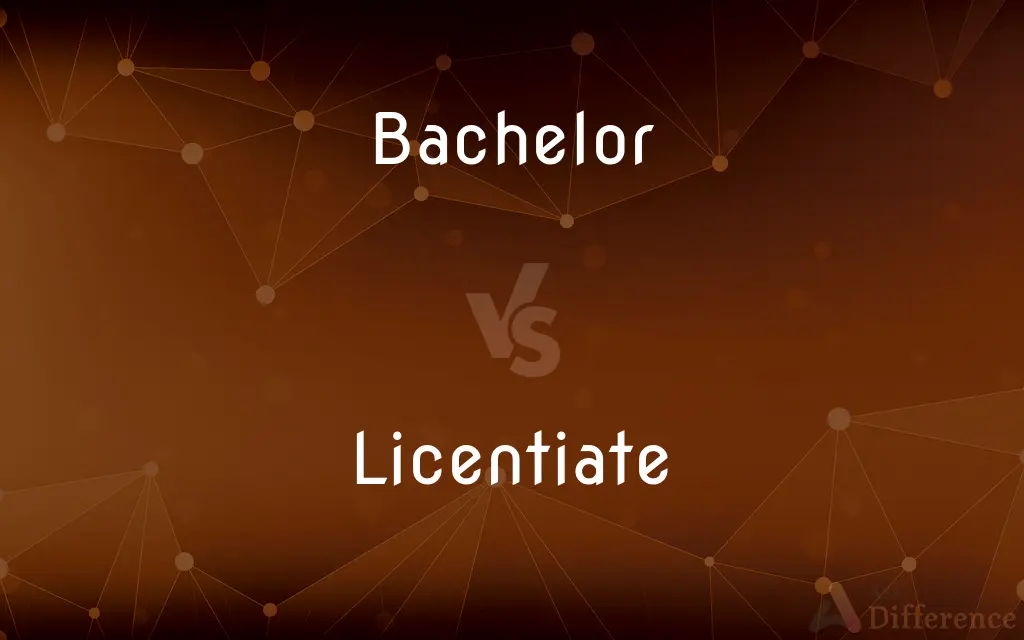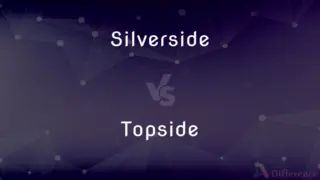Bachelor vs. Licentiate — What's the Difference?
By Tayyaba Rehman — Updated on September 18, 2023
A Bachelor's degree is an undergraduate academic degree awarded after completing a specific course of study. A Licentiate is a degree above a Bachelor's but below a Master's, often requiring a thesis and recognized mainly in European and Latin American co

Difference Between Bachelor and Licentiate
Table of Contents
ADVERTISEMENT
Key Differences
A Bachelor's degree is a widely recognized academic credential that marks the completion of an undergraduate course of study. This degree is awarded by colleges and universities in many countries, including the United States. A Licentiate degree, in contrast, is not as universally recognized and is mainly awarded in European and Latin American educational systems.
Bachelor's degrees can span a wide range of fields, such as arts, sciences, business, and engineering. These degrees often require approximately four years of full-time study in the United States. Licentiate degrees also cover various fields but are more research-focused, usually requiring the submission of a thesis or a comprehensive examination.
The Bachelor's degree serves as a prerequisite for pursuing higher education, like a Master's or Ph.D. In contrast, a Licentiate serves as an intermediate qualification between a Bachelor's and a Master's degree. Some countries even allow Licentiates to teach in universities or practice professionally.
In terms of duration, a Bachelor's degree typically requires around four years of study, while a Licentiate can take one to two years post-Bachelor's. Furthermore, the Licentiate often involves more specialized and in-depth study compared to the broader curriculum usually found in Bachelor's programs.
Comparison Chart
Level of Degree
Undergraduate
Above Bachelor, Below Master's
ADVERTISEMENT
Geographic Recognition
Global
Mainly European & Latin American
Duration
Approx. 4 years
1-2 years post-Bachelor's
Focus
General education and specialization
More specialized, research-focused
Requirements
Course completion
Often requires thesis
Compare with Definitions
Bachelor
An undergraduate academic degree.
She earned her Bachelor's in Computer Science.
Licentiate
Mainly awarded in European and Latin American countries.
Licentiate degrees are more common in Spain than in the U.S.
Bachelor
Awarded in various fields of study.
Bachelor's degrees can be in arts, sciences, or business.
Licentiate
Permits teaching or professional practice in some countries.
With a Licentiate, you can teach at a university in certain nations.
Bachelor
A foundation for higher education.
After receiving her Bachelor's, she pursued a Master's degree.
Licentiate
A degree between a Bachelor's and Master's.
He obtained a Licentiate in Philosophy.
Bachelor
A globally recognized degree.
A Bachelor's degree is recognized in many countries.
Licentiate
Takes 1-2 years after obtaining a Bachelor's.
He spent an extra two years earning his Licentiate.
Bachelor
A bachelor is a man who is not and has never been married.
Licentiate
One who is granted a license by an authorized body to practice a specified profession.
Bachelor
A man who is not married.
Licentiate
A degree from certain European and Canadian universities ranking just below that of a doctor.
Bachelor
A man who has never been married.
Licentiate
One holding such a degree.
Bachelor
A man who is not married and is not involved in a serious romantic relationship.
Licentiate
A person who holds the academic degree of license.
Bachelor
A person who has completed the undergraduate curriculum of a college or university and holds a bachelor's degree.
Licentiate
One who has a licence to exercise a profession.
A licentiate in medicine or theology
Bachelor
A male animal that does not mate during the breeding season.
Licentiate
A friar authorized to receive confessions and grant absolution in all places, independently of the local clergy.
Bachelor
A young knight in the service of another knight in feudal times.
Licentiate
One who acts without restraint, or takes a liberty.
Bachelor
A person, especially a man, who is socially regarded as able to marry, but has not yet.
Licentiate
One who has a license to exercise a profession; as, a licentiate in medicine or theology.
The college of physicians, in July, 1687, published an edict, requiring all the fellows, candidates, and licentiates, to give gratuitous advice to the neighboring poor.
Bachelor
The first or lowest academical degree conferred by universities and colleges; a bachelor's degree.
Licentiate
A friar authorized to receive confessions and grant absolution in all places, independently of the local clergy.
Bachelor
Someone who has achieved a bachelor's degree.
Licentiate
One who acts without restraint, or takes a liberty, as if having a license therefor.
Bachelor
(Canada) A bachelor apartment.
Licentiate
On the continent of Europe, a university degree intermediate between that of bachelor and that of doctor.
Bachelor
(obsolete) An unmarried woman.
Licentiate
To give a license to.
Bachelor
(obsolete) A knight who had no standard of his own, but fought under the standard of another in the field.
Licentiate
Holds a license (degree) from a (European) university
Bachelor
(obsolete) Among London tradesmen, a junior member not yet admitted to wear the livery.
Licentiate
Often requires the submission of a thesis.
She had to write a thesis to earn her Licentiate.
Bachelor
A kind of bass, an edible freshwater fish (Pomoxis annularis) of the southern United States.
Bachelor
A man of any age who has not been married.
As merry and mellow an old bachelor as ever followed a hound.
Bachelor
An unmarried woman.
Bachelor
A person who has taken the first or lowest degree in the liberal arts, or in some branch of science, at a college or university; as, a bachelor of arts.
Bachelor
A knight who had no standard of his own, but fought under the standard of another in the field; often, a young knight.
Bachelor
In the companies of London tradesmen, one not yet admitted to wear the livery; a junior member.
Bachelor
A kind of bass, an edible fresh-water fish (Pomoxys annularis) of the southern United States.
Bachelor
A man who has never been married
Bachelor
A knight of the lowest order; could display only a pennon
Bachelor
Lead a bachelor's existence
Bachelor
A four-year educational credential.
It took him four years to complete his Bachelor's degree.
Common Curiosities
Where is the Licentiate degree recognized?
Mainly in European and Latin American countries.
Can a Licentiate degree lead to a teaching career?
In some countries, yes, it permits teaching at a university level.
What is a Licentiate degree?
A Licentiate is a degree above a Bachelor's but below a Master's, often requiring a thesis.
Does a Licentiate require a thesis?
Often, yes, a thesis or comprehensive exam is required.
What fields offer Bachelor's degrees?
Most fields, including arts, sciences, business, and engineering.
What fields offer Licentiate degrees?
Various fields, but the degree is more research-focused.
How long does it take to earn a Bachelor's?
In the U.S., it typically takes about four years.
What is a Bachelor's degree?
A Bachelor's degree is an undergraduate academic credential awarded after completing a specific course of study.
Is a Bachelor's degree globally recognized?
Yes, it is recognized in most countries around the world.
Can I pursue a Master's degree after a Licentiate?
Yes, it serves as an intermediate qualification for further study.
How long does it take to earn a Licentiate?
Usually 1-2 years post-Bachelor's.
Do all Bachelor's degrees require the same duration?
Generally, but it can vary depending on the country and institution.
Share Your Discovery

Previous Comparison
Silverside vs. Topside
Next Comparison
Unplug vs. PlugAuthor Spotlight
Written by
Tayyaba RehmanTayyaba Rehman is a distinguished writer, currently serving as a primary contributor to askdifference.com. As a researcher in semantics and etymology, Tayyaba's passion for the complexity of languages and their distinctions has found a perfect home on the platform. Tayyaba delves into the intricacies of language, distinguishing between commonly confused words and phrases, thereby providing clarity for readers worldwide.















































